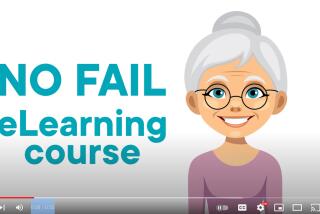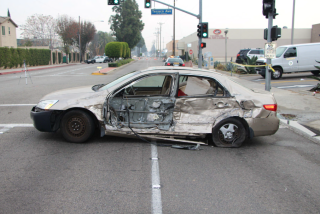Cruising on Easy Street in Online Traffic School
- Share via
This column is not an admission of guilt. I was doing the speed of traffic. That’s my story, and I’m sticking to it.
My heart sank when the red-and-blues flashed in my rearview mirror while I drove down the Harbor Freeway late one evening. As anyone who knows me would know, sweet-talking the officer was not an option.
The cost of the traffic citation wasn’t going to be a problem. It’s just money. But visions of blowing half a workday at Municipal Court and a spring Saturday at traffic school had me ticked.
When the citation came in the mail a few weeks later, I read over the legalese informing me that if I paid by credit card and was willing to admit guilt, I could handle the ticket by phone through their automated system.
Not perfect, I thought, but close enough. I had to worm my way through seemingly endless telephonic menus, but in the end, I paid the fine and cleared the citation, all without having spoken to a living soul.
Then, glancing over the form that explained my responsibilities in traffic school, my eyes rested on the warmest, most inviting three letters a geek has ever known: www.
The prospect of doing traffic school on the Internet inspired me to finally move my computer out of the spare bedroom and into the living room, a change I had been contemplating the last several months but for which I had lacked the motivation.
So while I sat at home answering questions on the computer about alcohol and reaction times, the distance one should stay behind a vehicle in the rain, and the importance of not passing vehicles while going up a hill, New York firefighters were on “Late Night With David Letterman” enumerating the “Top Ten Fun Things to Yell While Sliding Down a Fire Pole.”
It was a school night, however, and bedtime was rapidly approaching while I was only halfway through the tutorial.
No worries. I signed off and logged back on the next evening, answering questions while I played hearts with some strangers over the Yahoo card game network.
All told, traffic school on the Web took me perhaps two hours over a few days. Sixteen sections of reading, with each chapter followed by a quiz that required that every question be answered correctly before going on to the next chapter.
Miss a question? No problem. Click the back button in the Web browser to return to the reading section, do a keyword search for the correct answer in the text, click the forward button to return to the test question, and voila: a perfect score on every quiz.
Did I learn anything? That’s unclear. Would I have learned more by sitting in a physical classroom for eight hours listening to an 18-year-old comedian? Tough call.
Allen Levey, president of National Internet Traffic Schools Inc., said his course’s quizzes and final exam forces participants to at least wash the issues through their mind, even if they are watching soap operas while doing so.
“By experiencing this material, you glean something from it,” Levey said.
The Department of Motor Vehicles approves curricula for all traffic schools, but no scored tests are required for certification and there are no set standards. With offline traffic schools, only your physical presence and coverage of specific topics is required, Levey pointed out.
“You can literally go there and be drugged or go to sleep or read a book and come away with absolutely nothing,” Levey said. “You only need be present for a specific amount of time. The requirement with us is not a time issue but a completion of course content issue.”
But the convenience of online traffic school may soon be nullified.
A bill written by Assemblyman Thomas Calderon (D-Montebello) would force people taking a home-study traffic school course to then take an exam in person at a government office. The bill’s promoters say it would curb cheating in those courses, although the online schools say they have features in place to minimize the possibility of the wrong person taking the course.
The bill, which is in committee, would also initiate a study to determine the effectiveness of traffic schools of all kinds and create standards for the schools.
In any case, making government services fully electronic has been a long time coming. Previously, online traffic school still required a lot of paper shuffling by both the school and the violator. No longer.
Recently, Los Angeles Municipal Court has taken small but significant digital steps toward making the traffic citation less painful. The telephone payment system was unveiled last month, and a few weeks ago it launched a Web-based system for applying for an extension to resolve traffic tickets. Soon, people will be able to pay for citations online, according to Marcia Skolnik, spokeswoman for the court.
The court handles 600,000 citations a year, and under its previous telephone system, which was 10 years old, 4,000 callers a day got busy signals.
Three online traffic schools are qualified in Los Angeles County: Homestead Traffic School (https://www.hmall.com/traffic), Web Traffic School (https://www.webtrafficschool.com) and Home Traffic School (https://www.hometrafficschool.com). Orange County courts have not certified any online traffic schools.
California is the only state to allow online traffic school, Levey said.
Technology has a lot of functions, including entertaining and improving efficiency. Traffic school online comes under the rubric of avoiding pain. It ranks up there with pay-at-the-pump gas stations, bank ATMs and electronic ticketing kiosks in airports.
In our increasingly networked world, where more and more of us are always on, Jeremy Burton, vice president of server marketing at Oracle Corp., imagined the inevitable: “You can download the course onto your Palm Pilot and do it while you’re speeding down the freeway.”
I’ll be the one in the swerving red Toyota Tercel going 85 mph.
*
Jonathan Gaw can be reached via e-mail at jonathan.gaw@latimes.com.
More to Read
Sign up for The Wild
We’ll help you find the best places to hike, bike and run, as well as the perfect silent spots for meditation and yoga.
You may occasionally receive promotional content from the Los Angeles Times.






